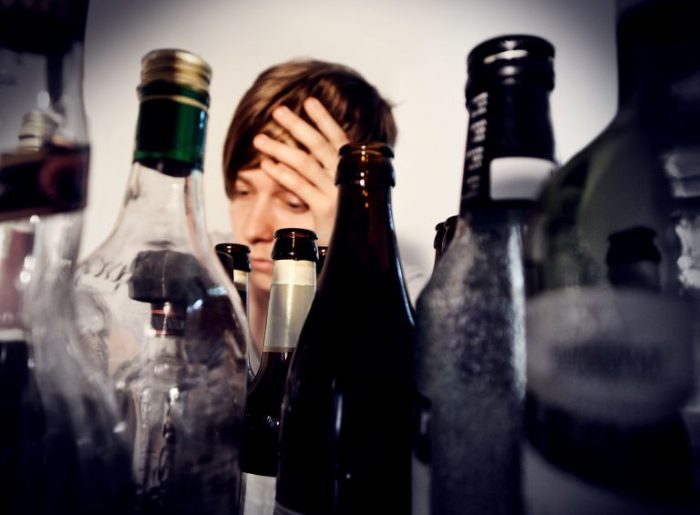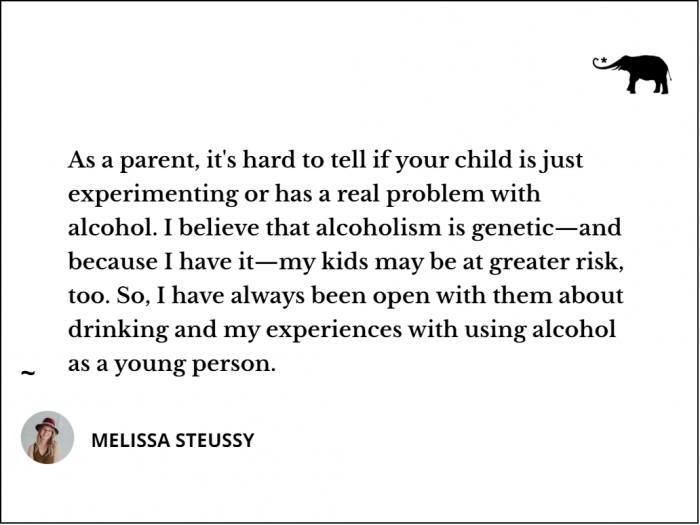It started innocently enough, a friend’s mom bought us some wine coolers and we sat around her trailer home, drinking.
We giggled while listening to music, usually Rob Base, and talked about our latest crushes.
Sometimes guys would buy us 40s of Old English when we would have sleepovers, so we started standing in front of convenience stores asking people to buy for us, which usually worked. We drank the typical MadDog 20/20 and Boones Strawberry hill straight from the bottle, whatever we could afford.
Sometimes we would even walk into the store and run out with an armful of beer, jumping into the getaway car.
Around age 15, I remember taking alcohol from the fridge at a party, Thunderbird to be exact. I vividly remember sneaking into the bathroom, pouring out the hairspray from the bottle, rinsing it out, and adding the alcohol, then putting the hairspray bottle in my pants to leave. I guess I would have rather been caught with the hairspray bottle than the bottle of cheap wine. Now looking it up it had an alcohol volume of 17.5 percent, almost as much as the hairspray, I presume.
At 17, I got a fake ID. It was of a girl that one of my guy friends worked with and the name on the ID was Keely. She did look similar to me with blond hair, but I had braces and was obviously younger. I would walk into the 7-11, grab the alcohol of choice, plop down my ID and wait. I would stare at the cashier as she looked at the ID and then back at me, and then sell it to me. Sometimes begrudgingly.
At bars, I would be told that they knew it wasn’t me, and if the liquor board or police came in, that I would need to get out of there. I soon became known at the local bars and was rarely carded.
Most of my friends had fake IDs and we would go to the bars in Pioneer Square in Seattle, and hop from bar to bar presenting said IDs. I never had a problem until one night when they kept making me sign the signature on the ID, which I had practiced many times, but I was so drunk I could hardly hold the pen, so they made me leave. Which resulted in me going into another drunken rage attack.
I didn’t like to be told no, and when drunk would usually end up in a tearful rage aimed at a friend or boyfriend. I would threaten to jump out of moving cars and throw bottles at people or vehicles.
Drinking was all I looked forward to. I liked going to get a new outfit at the local Ross Dress for Less, even when I had to get a payday loan to do it. Showing up at the bar, walking up and ordering that first drink or shot, in my new clothes gave me confidence, and made me feel good enough. Soon, we would all be dancing and laughing and then a switch would flip, and I’d be sloppy and looking for a bitch fight.
According to drugfree.org: “Alcohol is the most widely used substance among America’s teens and young adults, posing substantial health and safety risks.
Teens try alcohol for a variety of reasons: to exert independence, to feel more carefree, or escape from stress, peer pressure, and even boredom. Many tend to do so without fully recognizing alcohol’s negative effects or health risks.”
When I came home at 15 and puked all over the bathroom and passed out, by morning, it had all been cleaned up and no one mentioned it. I felt bad all day and my parents left me alone. I assume they thought it was funny.
As a parent, it’s hard to tell if your child is just experimenting or has a real problem with alcohol. I believe that alcoholism is genetic—and because I have it—my kids may be at greater risk, too. So, I have always been open with them about drinking and my experiences with using alcohol as a young person.
It affected my brain and my life negatively and I want better for them.
Research shows that underage drinking can have more of a debilitating effect on the brain than an adult would experience, although adult drinking isn’t much better.
Queensland health has this to say about drinking and brain development:
“One part of the brain that is affected by alcohol is the hippocampus. The hippocampus is a seahorse-shaped area deep inside your brain that is responsible for learning and memory.
Alcohol can damage or even destroy the cells that make up the hippocampus, which is why some people experience fuzzy memories or ‘blackouts’ after drinking. Because an adolescent brain is still developing, this damage can be particularly dangerous. Studies have shown that adolescents who drink heavily and often can actually have a smaller hippocampus than their peers, because of the damage done to this part of their brain by alcohol.
Your hippocampus will play a vital role in your brain function during and after adolescence. How well your hippocampus functions will affect how well you can learn and store short-term memories, which could play a part in how well you do at school, work, hobbies, and when learning new skills like driving a car.
You might not be aware of the effects, but the damage done to your hippocampus during adolescence can affect your brain’s potential to learn and remember new things for the rest of your life.”
I drank throughout junior high and high school and added harder drugs as I went. I struggled in school with academics as well as social and emotional reactions. I was always two steps (at least) behind and I barely coasted by.
Teenage drinking is not only dangerous for brain development but drinking and driving is still a huge issue. Throw in phones, and the lack of perception and judgment, and it scares me to think about it.
According to the CDC:
“Underage drinking is a significant public health problem in the U.S. Excessive drinking is responsible for more than 3,500 deaths and 210,000 years of potential life lost among people under age 21 each year. Underage drinking cost the U.S. $24 billion in 2010. There were approximately 119,000 emergency rooms visits by persons aged 12 to 21 for injuries and other conditions linked to alcohol in 2013.”
What do you do if you think your child has a problem with alcohol?
Have the talk. It’s important that even if our children are rolling their eyes in the tween and teen stages, we sit down and explain underage drinking and what the consequences are sooner, rather than later.
There are many great resources, but most importantly I feel like having a parent who is willing to be open to having the dialogue speaks volumes. We can’t just cover our eyes and ears and pretend like we don’t know what is going on in our child’s life. They need to know that we care and are here for them. We need to explain the dangers of driving while intoxicated, as well as getting in the car with others who have been drinking. We need to show them the long-term repercussions of drinking, and how it can affect our brains throughout the rest of our lives.
Through my research, I have learned that alcohol is responsible for more teen deaths than all other drugs combined.
How can we, as adults, get through to teens about the dangers of drinking?
I think it has to start early, but it’s also not too late to have the conversation. There are many alcohol treatment centers that will do an intake on teens to see if they are considered problematic in their drinking.
Kids are dying from vehicle-related drinking deaths, homicides, suicides, and other injuries where drinking is usually a culprit.
We mustn’t be afraid to bring this up and out into the open.
We can be the saving grace our kids need.
~
Resources for parents and teens: (Please Google for resources in your own area)










Read 10 comments and reply